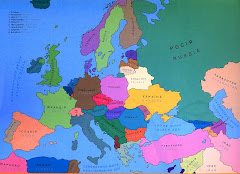


Barbara at the caves; the cave city Chufat-Kale; the Khans' palace with minaret and entrance to small mosque; and the Uspensky monestary.

Bakchysaray, which means "garden palace" in Turkish, was once the capital of the powerful Crimean Khanate between the 15th and 18th centuries. After decades of tragic destruction
from both the Russian Tzars and then the Soviets, the town and its treasures are coming back to life.
The Khans' original palace survives, supposedly
because Catherine the Great thought it was
"romantic and sweet," which it is. The

palace was built by slaves under the direction of Ottoman, Persian and Italian architects. This would be a fantastic story to research and study. It's noted for its intricate designs and gates, its lovely mosque and minarets, its pretty harem, its wall paintings and decorations, and beautiful courtyard. The "Fountain of Tears," erected by master Omer in 1764 to honor his daughter, moved famous Russian poet A.S. Pushkin to write his poem "The Bakchyrsaray Fountain" in the 1820s.
Nearby is the lovely Uspensky Monestary, built into the rocks, probably by Byzantine monks in the 8th or 9th century. The gold-domed church, whitewashed and tiled, shines like a bright star on the hillside. The Soviets closed the church down, but it opened once again in 1993 and is maintained by local monks.
The most fantastic hike is through the old cave city of Chufat-Kale, fortified both by nature and man. It is a complex series of caves and structures (sheds, homes and barns) built into the limestone rock, which provided a fortress and refuge for different groups of migrants for hundreds of years. The views of the valley below are breathtaking. The guidebook Barbara has said it was first settled by Christian descendants of Samarian tribes, then around 1390s by the Crimean Tatars, and after the Tatars dispersed, by a dissident Jewish sect, the Kainite Turkish Jews, until about the mid-19th century. This sect of Judaism gave the mountain its current name, Chufut-Kale.
Wow, if these hills could talk. Scholars have tried to listen; lots of archeologists, for example, have explored the caves and tried to reconstruct their complex history. It's certainly a scholarly feast. But I think my brother Loren could tell me more than any guidebook or scholarly studies. He knew this history and I wish he were here to tell me.
Bakchysaray is a fascinating part of Crimea, and the planet, a place where old civilizations sought refuge and moved mountains, and modern generations are moved to understand them.




























No comments:
Post a Comment